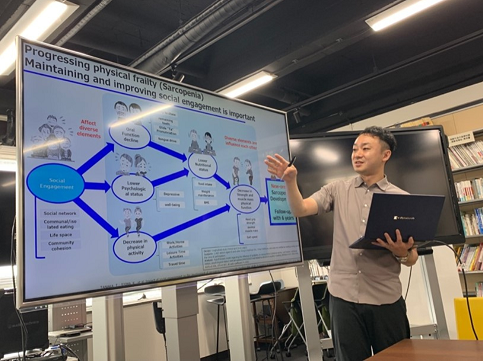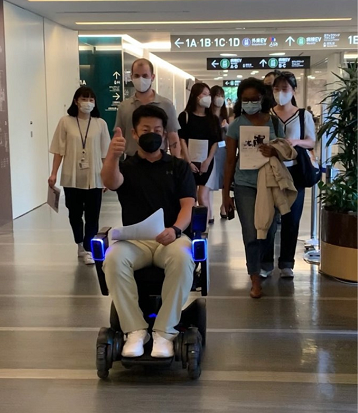Institute of Gerontology at the University of Tokyo
 On June 20, we started our day with a wonderful visit to the Institute of Gerontology at the University of Tokyo (UoT). First, Prof. Katsuya Iijima gave us an overview of the national long-term care insurance system, and community-based integrated care model in Japan that aims to maximize the access to healthcare for Japanese older adults. Then, Prof. Iijima’s colleagues talked about a large-scale, longitudinal frailty prevention program about health check-ups, as an exemplary elder care project in Japan. Dr. Son highlighted the application of “IKIGAI” – “what makes life worth living” in the project, as it is associated with enhanced regulation of physiological systems. Dr. Tomoki Tanaka and Weida Lyu further demonstrated positive outcomes linked to the health check-ups, such as participants’ improved awareness of the importance of social interactions and more active physical functions. Dr. Tanaka presented on the frailty prevention program about health check-ups.
On June 20, we started our day with a wonderful visit to the Institute of Gerontology at the University of Tokyo (UoT). First, Prof. Katsuya Iijima gave us an overview of the national long-term care insurance system, and community-based integrated care model in Japan that aims to maximize the access to healthcare for Japanese older adults. Then, Prof. Iijima’s colleagues talked about a large-scale, longitudinal frailty prevention program about health check-ups, as an exemplary elder care project in Japan. Dr. Son highlighted the application of “IKIGAI” – “what makes life worth living” in the project, as it is associated with enhanced regulation of physiological systems. Dr. Tomoki Tanaka and Weida Lyu further demonstrated positive outcomes linked to the health check-ups, such as participants’ improved awareness of the importance of social interactions and more active physical functions. Dr. Tanaka presented on the frailty prevention program about health check-ups.
 In the afternoon, we visited Keio University Shinanomachi Campus. Dr. Yasumichi Arai presented a fascinating study on Supercentenarians (older adults over 110 years old) as a part of Keio Global Initiatives. He shared with us that genes, a relatively warm environment, lifestyle (e.g., no smoking), and good health conditions and cognitive functions may contribute to an extremely long life span, but the effect of genes may only account for 20%.
In the afternoon, we visited Keio University Shinanomachi Campus. Dr. Yasumichi Arai presented a fascinating study on Supercentenarians (older adults over 110 years old) as a part of Keio Global Initiatives. He shared with us that genes, a relatively warm environment, lifestyle (e.g., no smoking), and good health conditions and cognitive functions may contribute to an extremely long life span, but the effect of genes may only account for 20%.
Last but not least, we had an eye-opening tour at the hospital led by Dr. Arai and other hospital staff. We were impressed by the high-technology applications in the hospital setting. For example, the hospital beds management system is monitored and updated every 15 minutes to provide timely information about the availability of beds. A robot has been used to deliver drugs, and an automatic medicine dispenser machine could handle 60% of prescriptions for inpatients. Some of us also experienced an automatic, driverless wheelchair and the standing CT with very fast speed. In summary, after our visits, we further deepened our understanding of Japan's elder care and health care system.
Peiyuan Zhang
PhD Student at University of Maryland School of Social Work